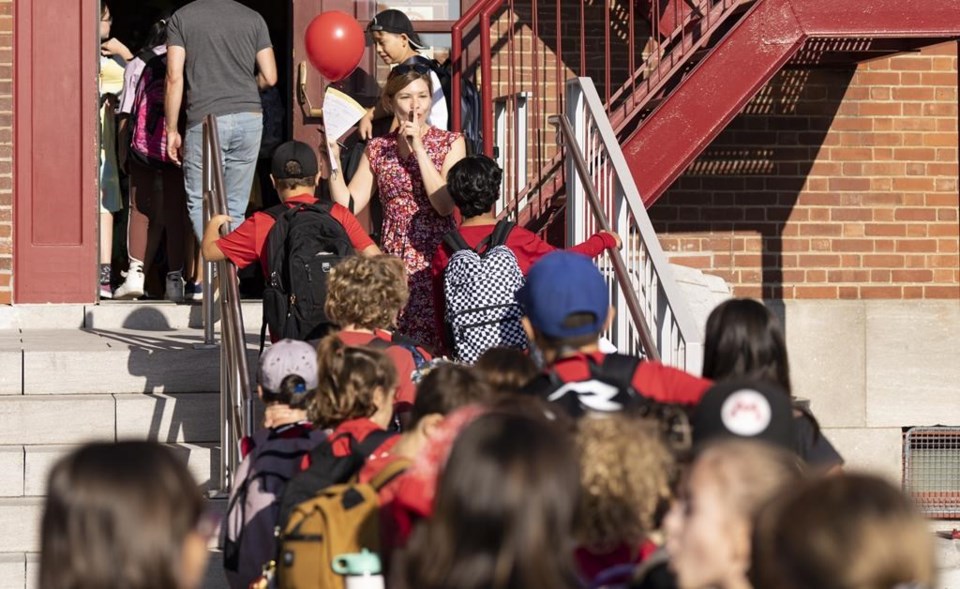Some of the largest school boards across Canada will begin the new school year without formal policies on the use of artificial intelligence in the classroom, despite concerns about how the technology will impact learning and academic integrity.
But while there seems to be wide consensus on the need for more guidance and vigilance when it comes to AI in schooling, one education expert says blanket policies are not likely to help anyway.
The Canadian Press asked 10 school boards in different parts of the country whether they would implement a formal policy for the 2023-24 school year that covers teacher and student use of AI, such as chatbots that can solve math problems or write essays.
Among the boards that responded to the survey, none had an official AI-specific policy in place. Some said they would apply their existing codes of conduct to the use of AI in the classroom, while others said they’re in consultations on how to best tackle the fast-growing issue.
Toronto District School Board, the largest in the country, only said in a brief statement that its staff will be “looking into it further” to determine if any changes are required to the board’s academic honesty rules.
Just west of Toronto, the Peel District School Board said it is “keenly aware of the ethical implications and potential risks associated with AI in education” and is taking a “proactive approach” to mitigate any risks.
“Through ongoing discussions and collaboration with departmental staff and consultants, the school board is ensuring that our artificial intelligence implementation aligns with best practices, ethical considerations, and the unique needs of our diverse student population,” the school board said in a statement. “This work will inform board policy on use of AI in classrooms and any mitigating action, if needed.”
The Calgary Board of Education said it does not have a formal policy on AI but it’s working with schools to “build a common understanding of AI’s legitimate uses and limitations in education,” with a focus on ethics. The board said expectations of students are already outlined in its student code of conduct and teachers must “clearly identify” when use of AI is not permitted in assignments.
“As educators, we support the use of assistive tools to enhance learning, not to replace it,” the board said in a statement.
The Winnipeg School Division also said it does not have an official policy but its message to teachers is “that there is a learning component to AI and they should ensure ethical and effective ways of using the tool in their classrooms.”
Meanwhile, Saskatoon Public Schools division said more research on the benefits and impacts of AI use is needed “before policy development can be explored.”
Lauren Bialystok, a professor of social justice education at the University of Toronto's Ontario Institute for Studies in Education, said it’s not surprising that school boards aren’t instituting formal policies on AI. She’s also not convinced such policies would work.
“We need more refined and more sensitive ways of understanding what constitutes legitimate or illegitimate use of these tools,” she said in an interview.
"And a board-wide policy or even a school-wide policy — in some cases even a department-wide policy — will necessarily be too general, or too specific for someone.”
Bialystok said it’s a fact that AI tools such as ChatGPT, the chatbot that exploded in popularity as soon as it was launched last fall, pose a threat to academic integrity – especially in post-secondary education. But despite its pitfalls, AI also offers “education potential” and there are proven ways that students and teachers can use it to enhance learning, she noted.
“So something like, say, a ban is not only completely naive and impractical, but actually misses the multifaceted nature of these technologies.”
One of the main rationales for an AI policy would be to detect and minimize cheating but coming up with a comprehensive set of rules for schools is “very difficult” for several reasons, she said.
For example, the risks and benefits vary by subject. “What may be admissible for using AI in a science class may be less admissible in an English class, or vice versa.”
She also noted that AI is constantly evolving so it would be very hard to keep up with it from a policy perspective.
Instructors from across the country have told The Canadian Press in recent months that they use the tool for course planning, administrative tasks and even incorporate it in some student assignments.
But Bialystok said that while plenty of tech-savvy teachers are happy to experiment with AI in the classroom, many also “don’t have the time or the wherewithal” to figure out how to employ and monitor its use.
“Their profession, in a sense, has changed overnight and they didn't have enough support or respite or professional development anyway to begin with,” she said.
Sarah Eaton, an associate professor at the University of Calgary and an expert in AI education, has said that school boards and education ministries should consider professional development for teachers to better understand AI and how students may be using it.
Eaton said she’s worried about teachers “turning a blind eye to the technology” in the classroom.
“We can't control it and we can't ban it but we can help students learn to use it, in a supervised way, in a thoughtful way and a meaningful way."
--With files from William Eltherington
This report by The Canadian Press was first published Sept. 2, 2023.
Sonja Puzic, The Canadian Press




